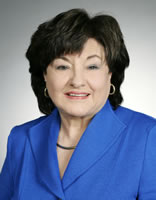Senate Passes Easley Bill Tackling Childhood Obesity
 Sen. Mary Easley
Sen. Mary Easley
The Oklahoma State Senate approved a measure Tuesday aimed at tackling the growing epidemic of childhood obesity. Senate Bill 1186, by State Senator Mary Easley, (D-Tulsa) increases the physical activity requirement in grades kindergarten through fifth grade from 60 minutes each week to 120 minutes each week.
Easley explained those minutes could include physical education, exercise programs, fitness breaks, recess, classroom activities, and wellness and nutrition education.
“Childhood obesity is a growing epidemic across the country and as policy makers we have a moral obligation to do all we can to reverse this most tragic trend,” Easley said. “We know that moving more and making healthier food choices will go along way to reduce the numbers of children who struggle with obesity. This legislation encourages our schools to help our kids become more active and in turn lead healthier lives right from the start.”
Senator Easley said her legislation shows good judgment and responsibility by allowing each school district's board of education to determine the specific activities and means of compliance for this requirement and give consideration to the recommendations of each school’s Healthy and Fit Schools Advisory Committee as submitted to the school principal.
“We owe the children of Oklahoma the best possible childhood—that includes being healthy and physically fit.” Easley said. “We must incorporate this mentality into our public school systems and teach kids at a young age the critical importance of exercise and a healthy diet.”
Easley said statistics have shown that obese children run the risk of developing heart disease, type II diabetes, high blood pressure, some cancers and even arthritis.
Even more alarming are statistics from the Oklahoma FIT KIDS Coalition that show 15 percent of Oklahoma teenagers are considered “severely overweight or obese”– a 300 percent increase in the past 20 years; only 37 percent of Oklahoma students are enrolled in physical education compared to 55.7 percent nationally and 44.7 percent of Oklahoma children spend an average of 2 to 3 hours watching television or playing video games on an average school day, compared with 37.7 nationally.
“These numbers show us we need to be doing more for the health of our children, and the passage of this bill today is a good start,” Easley said. “An investment in a healthier start for our children will lead to a healthier adult population which will ultimately lead to a healthier Oklahoma for all of our citizens.”
 Oklahoma Senate
Oklahoma Senate

